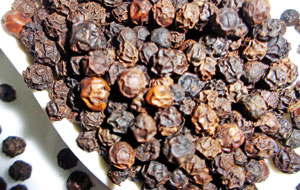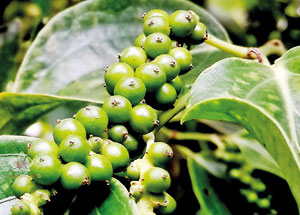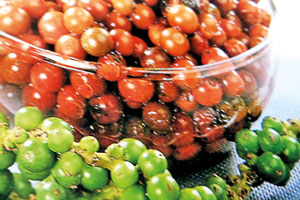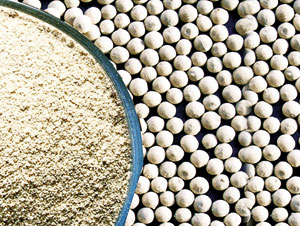The heat is on with the ‘king of spices’

Black pepper is made by picking fully mature berries and drying them which causes them to shrivel and wrinkle and become black or dark brown. Black pepper has a fine pungent fragrance, a hot and biting taste and a penetrating aftertaste.
Imagine an egg hopper or fried egg without that sprinkling of pepper. If pepper had a twin would the name be salt? Of course it will be as they are inseparable being always commonly paired together. Pepper, Piper nigrum (Gammmiris in Sinhala and Milahu in Tamil) in the family Piperaceae commonly described as the “king of spices,” is the second most important spice crop grown in Sri Lanka with the first being cinnamon.
Pepper is cultivated mainly in the districts of Matale, Kandy, Kegalle, Kurunegala and Nuwara Eliya. The pepper plant that is an evergreen perennial vine produces berries that are known as peppercorns. Ground peppercorns produce the spice we call pepper. The major product is black pepper, while white pepper and small amounts of green pepper and red pepper are also produced. Pepper oil and oleoresin are marketed as value added products.
Pepper components
The volatile oil mainly found in the outer hull of peppercorns gives the citrusy, woody, and floral flavour while the alkaloid piperine derived both from the outer fruit and the seed accounts mostly for its spicy heat. This explains why white pepper although pungent has little aroma. When pepper is ground or crushed, the flavour compounds in the essential oil gradually diminish. The Sri Lankan black pepper that has high piperine content fetches a premium price in the international market.
Buying and storing
Pepper is available throughout the year. The best black peppercorns have a dull look. If it is shiny, it may be an inferior product.Whole peppercorns will keep for months in a dry air tight container at room temperature in a dark place. When pepper is ground, the volatile oils come rushing out and are lost with time.If you have to buy ground black pepper, make sure it has both white and black specks , if is too black, it means that it is a sub-standard product. Ground pepper will have a longer shelf life if stored in the refrigerator.You may find white peppercorns in a grocery store but they can be very expensive. The green and red pepper if at all available will be in the ‘pickles’ section in a supermarket.

Green pepper is made from green berries. They are blanched and dried or are freeze dried to retain the green colour and canned, pickled, or used fresh. Green pepper is less pungent than black pepper.
Culinary uses
Black pepper is one of the most widely used spices. In salad dressings, sauces, soups, spice mixtures and marinades it is a must. Fish, meat and poultry to be grilled, baked, stewed or curried needs a good rub of ground pepper. Your steak is enjoyed best with a pepper sauce. Beans, lentils and vegetables also need pepper. White pepper is mostly used in white sauces and cream soups to preserve their appearance. If you can find fresh young green peppercorns use them in your meat-based Thai curries or spicy stir-fries. They are also great in a coconut sambol (pol sambol) or in a polos (tender Jak fruit) mallung. Brined peppercorns must always be rinsed before use.
Just a couple of grinds of black pepper with a sweet meringue, acidic fruits such as pineapple or a fruit dessert is just great. This is not all–you can add it to sweet breads, pies, tarts and cakes to give a special punch. Or try grinding black pepper over a bowl of macerated strawberries, the subtle flavour is just too delightful.
Health benefits Good for stomach
Pepper stimulates acid secretion in the stomach, thereby facilitating digestion. It also helps in preventing the formation of intestinal gas. This is why your mother told you to eat ripe Jak fruit (waraka) with a dash of pepper.
Helps weight loss
The outer layer of the peppercorn assists in the breakdown of fat cells and thus is a good way to help you shed weight naturally.
Stimulates skin pigmentation
The piperine content of pepper can stimulate the skin to produce melanin producing cells and cure vitiligo, which is a skin disease that causes some areas of skin to lose its normal pigmentation and turn white.

are fully ripe berries, usually available preserved in brine or vinegar. They have a soft outer shell with a delicate almost sweet fruity taste.
Provides respiratory relief
Pepper has expectorant properties that provide relief from sinusitis and nasal congestion by helping to break up mucous and phlegm deposits in the respiratory tract. Due to its natural irritant property, pepper helps to expel these loosened materials through sneezing or coughing.
Anti-bacterial properties
The antibacterial property of pepper helps to fight against infections and insect bites. Also when added to your food,it helps to keep the arteries clean by scraping excess cholesterol from the walls and helping to reduce atherosclerosis, a condition responsible for heart attacks and strokes.
Has antioxidant potential
The antioxidant potential of pepper can prevent or repair damage caused by free radicals and protects the system from cancer, cardiovascular diseases, liver problems, premature aging symptoms, macular degeneration and memory loss.
Enhances bio-availability
Pepper helps in transporting the benefits of other foods to the different parts of the body thus maximizing the benefits of food we consume.

is made from berries that are yellowish red and almost ripe and soaking them in brine to remove the outer shell then rinsing and drying. White pepper is less aromatic but has a sharp pungency with a sweetish after note.
Increases metabolism
Most of us will experience a quick sweat when consuming anything spicy including black pepper. Sweating naturally allows the body to release toxins while regenerating energy and increasing metabolism.
Health risks
As pepper may cause sneezing, those who have undergone abdominal surgery should not add too much pepper to their food as it can have an irritating effect on the intestines. Also food prepared with pepper should be avoided by those with stomach ulcers and digestive disorders. Black pepper in high concentrations may cause allergic reactions in some.
Quick Tip
Always use fresh ground pepper for maximum pungency. This is quite easily done by investing in a pepper mill or grinder. Many fuss and mess-free types are available.


